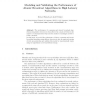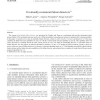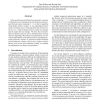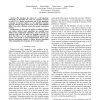14 search results - page 2 / 3 » Timeliness, failure-detectors, and consensus performance |
EUROPAR
2007
Springer
13 years 11 months ago
2007
Springer
Abstract. The performance of consensus and atomic broadcast algorithms using failure detectors is often affected by a trade-off between the number of communication steps and the ...
PDP
2002
IEEE
13 years 10 months ago
2002
IEEE
The concept of unreliable failure detector was introduced by Chandra and Toueg as a mechanism that provides information about process failures. This mechanism has been used to sol...
DSN
2006
IEEE
13 years 11 months ago
2006
IEEE
In the asynchronous distributed system model, consensus is obtained in one communication step if all processes propose the same value. Assuming f < n/3, this is regardless of t...
PODC
2009
ACM
14 years 6 months ago
2009
ACM
d Abstract] Marcos K. Aguilera Microsoft Research Silicon Valley Mountain View, CA, USA Carole Delporte-Gallet Universit? Paris 7 Paris, France Hugues Fauconnier Universit? Paris ...
SRDS
2010
IEEE
13 years 3 months ago
2010
IEEE
We introduce the notion of a swift algorithm. Informally, an algorithm that solves the repeated consensus is swift if, in a partial synchronous run of this algorithm, eventually no...




